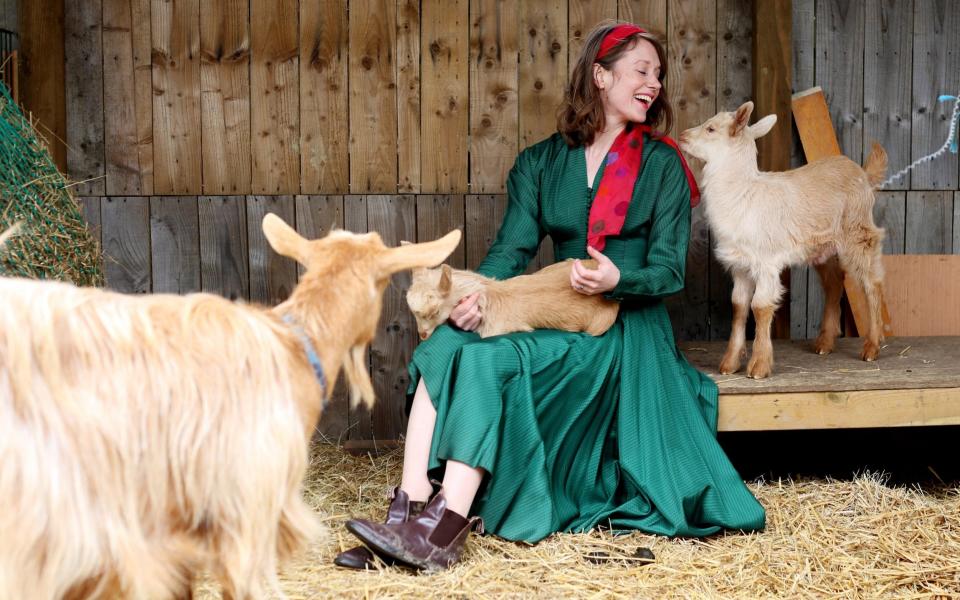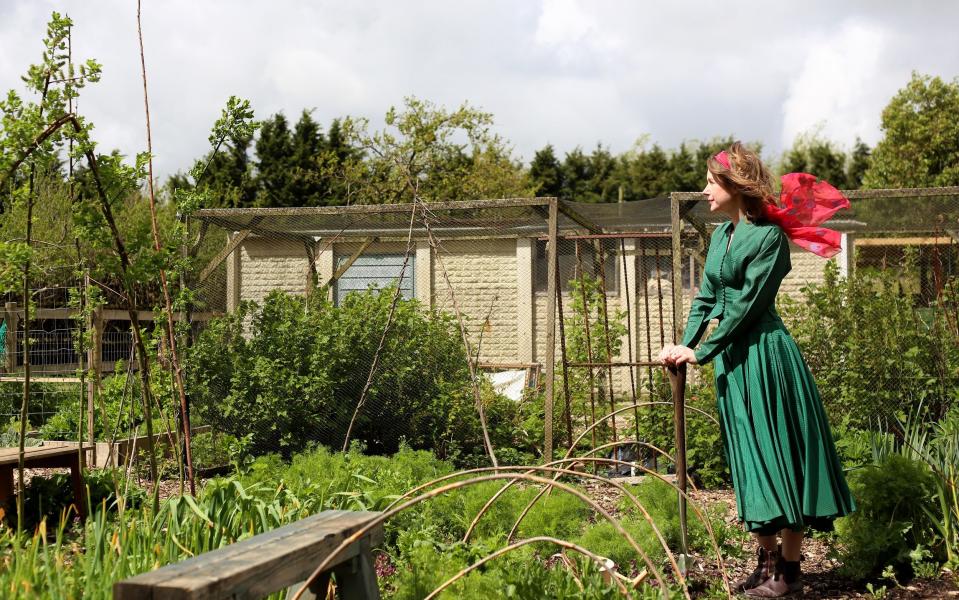We moved to the country for an easier life – then I had a breakdown

It was the absence of noise that I noticed first when my family and I moved from a semi-detached Victorian house in Ramsgate to a 1920s bungalow on a two-acre plot in the Weald of Kent in January 2017. Arguments in the street, horns blaring and the thumping bass of a neighbour’s party were gone, replaced by the gentle soundtrack of wind in the branches and a blackbird’s morning song.
We’d thought a rural good life would make everything simpler, calmer and easier – that our family would feel more connected and be less distracted by Wi-Fi and work. I wanted to live in a way that did less damage to the planet, to learn forgotten skills and had hoped to find a place in which my problematic natural restlessness would subside.
Yet as my husband and I got to work on our new patch of Kentish mud – balancing learning how to sow seeds and trim hooves for the first time with two children (then three and seven) and two demanding careers (me as a small charity CEO, journalist and author; my husband as a filmmaker) – the cacophony in my brain dialled up instead of down.
Over the coming months I attempted to will the peace I craved into being with a frenzy of activity. I grew every vegetable and herb I’d heard of – and some I hadn’t – and as I tried harder to make my vision into a reality, my palms blistered, my freckles darkened and I felt increasingly out of control.
Within two years I had gained plenty of brassica-based knowledge but also added a diagnosis of anxiety and depression to my life. I had scaled back my career and shrunk from friends. I struggled to make decisions, had become afraid of driving and suffered emotional peaks and dips that made me wonder if I might have bi-polar disorder.
Gone was any idea of my husband and I growing closer through our shared work on the land. Instead it felt as if we were on different paths, our relationship pulling taught as they diverged. Finding the time and energy to earn money to maintain our smallholding, doing the work on it and trying to recover from my mental health wobble seemed like an impossible triangle. We were in the backbreaking, marriage-straining reality of the good life and finding that it didn’t feel very good at all.
In June 2019, I finally tipped off a ledge I’d been teetering on for years. I was having a crisis, a breakdown of some sort, and perhaps I’d been having it in slow motion for some time. My kind GP did all he could; listening to my ashamed and scattered spiels and referring me to the local psychiatric service. He appealed when his referral was rejected but, when I was denied help for the second time and put on a long waiting list for Cognitive Behavioural Therapy instead, it became clear that I was going to have to find my own way out of the internal mess I found myself in.

I looked for ways to get through the days without my thoughts spiralling. Repetitive tasks like weeding, filling barrows with woodchip and pushing marigold seeds into modules of compost helped but my mind still wandered off to the jobs undone and the intrusive thoughts of harming myself that soon followed. Needing something more, I tried noticing things on the smallholding and giving my brain permission to take me on flights of research and imagination instead. I observed a pair of goldfinches feeding an injured fledgling, watched a carder bee on the field scabious flowers and then fell into online wormholes that took me from endangered species lists to the names of old pastures: Footway Field, Church Hams, Cow Den.
Though I was still volatile, my project to dig into the land in this different way began to act as a buffer to darker impulses. Armed with a pile of old maps and a tower of secondhand books, I attempted to trace and understand the pull that I had felt to a simpler, more self-sufficient life. I looked for others who had followed their dreams in hard times past; joining online genealogy sites, spending days meticulously tracing births, deaths and marriages in parish records, speaking to local historians and following endless internet wormholes to explore the lives of women who had worked and walked my land years before.
It helped. When something simple defeated me I could now take comfort in the grounding knowledge that Joane Newman, a 17th century widow, had owned a large piece of somewhere very near to me. I discovered that she had lived like the times she was in: tumultuously, outrageously, going on to outlive three husbands and become mistress of her own large plot.
I continued my search and found more historical characters to weave into my life. Elizabeth Nicholson: an 18th century single mother who moved from Scotland to a disastrous English smallholding project and limped home less than a year later. A settler who fled from the unrest and poverty in my Kentish village to start a new life in 19th century America. And the young Tsawataineuk First Nation woman who looked on as this new arrival cut her people off from land they had been part of for generations.
These women had not had the opportunity to make enough marks in the records to flesh out their stories, so I used my imagination to colour their lives in. On difficult days I would go outside to feed the courgette plants and as I worked, instead of pushing the fullness inside my skull away as I had always done before, I embraced it and used it to bring Joane, Elizabeth and all the others back to life. Soon they were holding the watering can with me and it felt lighter as they explained the many ways in which they had resisted the confines they were supposed to live within, how they had failed or been failed and how they had managed to carry on.

Two years have passed since I conjured up the help I needed from old ink and vegetable beds but that is not all I stumbled on while I waited for outside help. As I roved the internet in 2019 I found an article about high-functioning women whose spiralling mental ill health had been due to undiagnosed Attention Deficit Hyperactivity Disorder (ADHD) and the exhausting coping mechanisms they had unconsciously employed to fit in and succeed.
Though it took until Feb 2020 to receive my official diagnosis, I knew almost instantly that their stories, like Joane’s, were my story too. I find the world a smorgasbord of inspiration and importance just as they did and have a relentless energy that is both the best and worst thing in the world. I can be focused, creative and strong one moment and lashing out and melting down over making a cup of tea the next. The internal swirl I am often disorientated by is a symptom of the way my neurons will always work, but specialist therapy, medication and learning more about the way my neurodivergent brain works are helping. Like all people with ADHD I’m at greater risk of depression, anxiety, self-harm and suicide. Feeling overwhelmed by life is something I will always battle with and there is certainly plenty to overwhelm me here.
Despite the extra work and the challenges smallholding life poses for me I am now certain that this life offers me more than it takes away. There are enough physical tasks here to discharge my hyperactivity and plenty of opportunities to train myself in patience.
Every day I walk the same loop as I did five springs ago when we arrived here with not much more than a lorry full of dreams. It is not silence that I notice first now but layers upon layers of noise. Under the din of geese, goat kids, farm machinery, a much-loved husband and the two children he’s chivvying are the remembered sound waves of the difficult reality we’ve been living through.
If I tune in a little more carefully I can also hear the no-nonsense voices of the centuries of rural women I have since let into my life. They remind me that living on the land has never been easy and that living in a different kind of mind won’t be simple either. Yet thanks to their reminders, and the place they have connected me to, I’m still here; with the earth under my fingernails, busy discovering the truth and finding it so much richer than any escape-to-the-countryside fantasy could ever be.
Earthed by Rebecca Schiller is out now (£14.99, Elliott & Thompson). Buy for £12.99 at books.telegraph.co.uk or call 0844 871 1514


